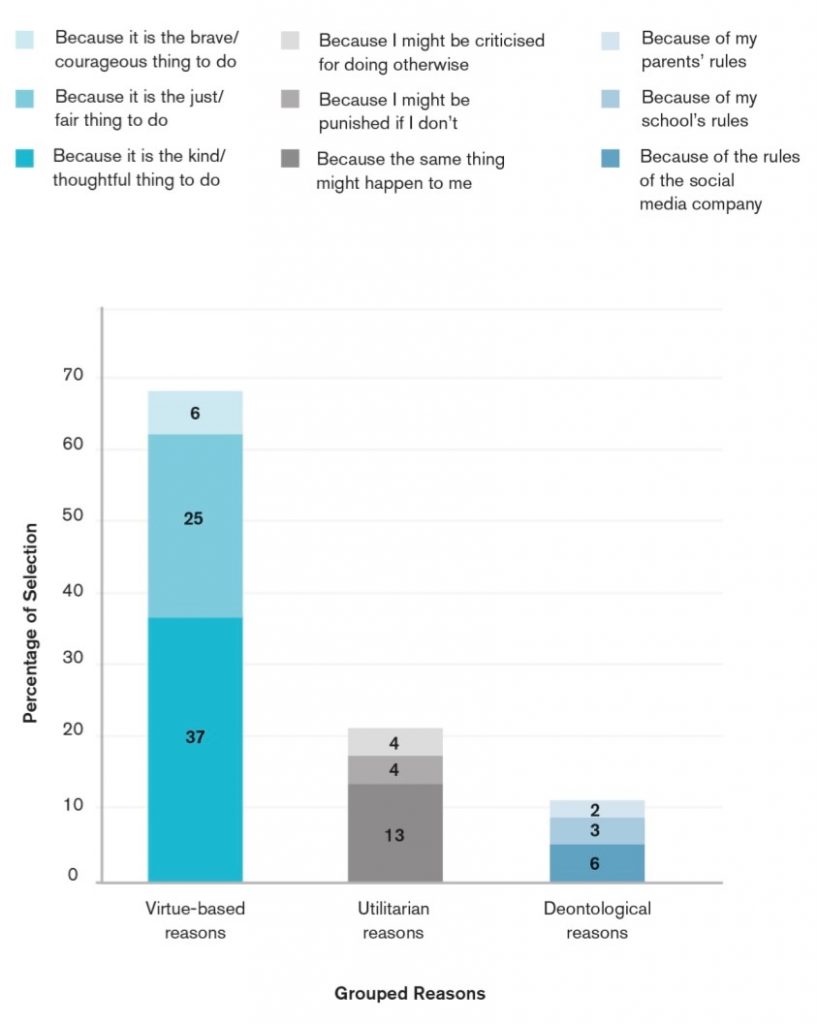 Children of all ages are at the forefront of using digital technologies but we often hear in the media how their internet use can be risky and potentially harmful. Concerns range from exposure to hurtful online behaviour such as cyberbullying, to inappropriate or unreliable content, and the possibility of negative effects on children’s wellbeing and flourishing. For www.parenting.digital, Gianfranco Polizzi and Tom Harrison discuss their new findings and how a “cyber-wisdom” approach to digital citizenship education can help children to make better ethical decisions online, particularly when interacting and communicating with others.
Children of all ages are at the forefront of using digital technologies but we often hear in the media how their internet use can be risky and potentially harmful. Concerns range from exposure to hurtful online behaviour such as cyberbullying, to inappropriate or unreliable content, and the possibility of negative effects on children’s wellbeing and flourishing. For www.parenting.digital, Gianfranco Polizzi and Tom Harrison discuss their new findings and how a “cyber-wisdom” approach to digital citizenship education can help children to make better ethical decisions online, particularly when interacting and communicating with others.
According to Ofcom, children aged 8-15 find that hurtful behaviour online is not uncommon and are often unsure what to do when such incidents happen or where to draw the line between funny and unacceptable. Undoubtedly, internet corporations and policymakers need to better regulate and (re)design the digital environment, as reflected in the decision of the UK Government to give Ofcom new regulatory powers. Meanwhile, policymakers, educators and parents alike need to ensure that children develop the skills, knowledge and values required to navigate online risks and opportunities both wisely and responsibly.
At the Jubilee Centre for Character and Virtues – a research centre specialised in neo-Aristotelian character education – we recently published a report entitled A Cyber-Wisdom Approach to Digital Citizenship Education. Based on two surveys, our report shows that many adolescents and parents value the importance of showing wisdom online. These findings set the scene for a school intervention, which we are currently developing, that encourages students to cultivate what we call cyber-wisdom – the ability to do the right thing at the right time when online. Like the Aristotelian concept of phronesis (i.e., practical wisdom), such an ability is an intellectual virtue. But it also functions as a meta-virtue that is crucial, especially when presented with moral dilemmas, to choosing the right course of action and to deploying multiple virtues (e.g. compassion, honesty) depending on context. This may include, for instance, deciding whether to be loyal to a friend or to report something that they might have done online.
Based on our findings, we argue that it is important to take a cyber-wisdom approach to digital citizenship education. Before unpacking what we mean by this, what is digital citizenship education and what are the key findings from the surveys?
Digital citizenship education
Digital citizenship education is broadly understood as the teaching of how to use digital technologies responsibly, particularly when interacting with others and in the context of social participation. This form of education is not firmly embedded in the UK school curriculum. However, many schools in the UK employ strategies to teach some elements of moral education as part of digital citizenship education and often in synergy with digital literacy education, which is concerned with the functional and critical skills and knowledge required to use digital technologies.
Whether through assemblies, through Citizenship, Computing or Personal, Social, Health and Economic (PSHE) education, or through advice to parents, most schools adopt strategies that may be classified against three prominent moral theories:
- Deontology – imposing rules and norms of appropriate behaviour, for example in relation to screen time or smartphone use in the classroom.
- Utilitarianism – encouraging students to think about the consequences of their online actions).
- Virtue ethics – cultivating character virtues such as compassion, honesty and wisdom.
However, not only is little known about the effectiveness of these strategies, but in order to inform how educators might draw on different moral theories, it is essential to first understand how children make moral decisions online. As a result, our study explored the extent to which these strategies underpin in practice how adolescents use digital technologies, how parents mediate their children’s internet use, and what virtues both adolescents and parents value the most online.
Key findings
We conducted two surveys at the end of 2020: with 1,947 adolescents aged 13-16 in England, and with 1,515 parents of 13–17-year-olds in the UK. Here is what we found:
- Presented with the possibility of witnessing online abuse (i.e. a negative post on social media addressed to one of their classmates) , most adolescents reported that they would react in ways that are overall morally engaged (74%). Some of the most common responses include sending a nice message to the person insulted (19%), asking not to be tagged in such hurtful messages (17%), or telling a parent or teacher (14%).
- A quarter (26%) would react in a morally disengaged way. Small numbers would forward the post to others (1%) or post a comment in support of the hurtful post (1%). However, the most reported individual reaction was to “do nothing” (21%), which is a form of moral disengagement.
- The explanations that most adolescents chose in support of their morally engaged reactions were virtue-based (68%), followed by consequence-based (i.e., utilitarian) (21%) and rules-based (i.e., deontological) (11%) reasons (Figure 1).
- The virtue that most adolescents wanted their friends to show on social media was wisdom, with 38% choosing this as one of their top two desired qualities (Figure 2).
Figure 1. Adolescents’ reasons behind their morally engaged reactions
Figure 2. Virtues that adolescents prioritise
- Meanwhile, wisdom is the virtue that most parents also wanted their children to show online, with 56% choosing this as one of their top two qualities (Figure 3).
- Overall, when it comes to managing their children’s internet use, parents prioritised cultivating character and virtues (44%) over trying to teach their children about the consequences of their online actions (27%) or making rules (19%).
- 77% of parents felt that their children’s schools should make more effort to teach about good character, wisdom and virtues in relation to the internet.
Figure 3. Virtues that parents prioritise
Taking a cyber-wisdom approach
These findings have practical implications. More specifically:
- The extent to which both adolescents and parents value the importance of wisdom online suggests that cyber-wisdom education is crucial in the digital age to cultivating, in synergy with utilitarian and deontological principles, students’ character virtues and wisdom in relation to the internet.
- At the Jubilee Centre, we are currently developing an intervention that is based on the delivery and evaluation of a cyber-wisdom programme for secondary school students. The programme encourages students to develop and deploy online multiple virtues, such as compassion and honesty, as well as wisdom, understood as a meta-virtue. The findings from our report invite similar interventions to be designed, tested and implemented.
- Cyber-wisdom education should become an integral part of digital citizenship education. Concerned with how to use digital technologies responsibly, digital citizenship education should be promoted by policymakers with the support of educators and parents in ways that, besides equipping students with digital literacy, prioritise their development of cyber-wisdom.
First published at www.parenting.digital, this post gives the views of the authors and does not represent the position of the LSE Parenting for a Digital Future blog, nor of the London School of Economics and Political Science.
You are free to republish the text of this article under Creative Commons licence crediting www.parenting.digital and the author of the piece. Please note that images are not included in this blanket licence.
Image credit: photo by Adam Winger on Unsplash








